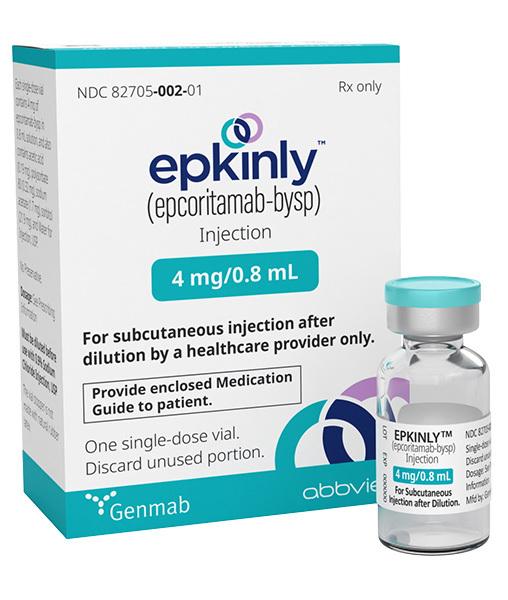Epkinly (epcoritamab-bysp) vs Columvi (glofitamab-gxbm)
Epkinly (epcoritamab-bysp) vs Columvi (glofitamab-gxbm)
Epkinly (epcoritamab-bysp) and Columvi (glofitamab-gxbm) are both investigational bispecific antibodies designed to target CD20 on B cells and CD3 on T cells, potentially enhancing the immune system's ability to fight cancer. While both are being studied for the treatment of B-cell non-Hodgkin lymphoma, they may differ in their molecular structure, dosing regimen, and clinical trial results, which can influence their efficacy and safety profile. Patients should consult with their healthcare provider to discuss their specific medical condition, treatment history, and the latest clinical evidence to determine which medicine, if either, is most appropriate for their individual case.
Difference between Epkinly and Columvi
| Metric | Epkinly (epcoritamab-bysp) | Columvi (glofitamab-gxbm) |
|---|---|---|
| Generic name | Epcoritamab | Glofitamab |
| Indications | Under investigation for B-cell non-Hodgkin lymphoma | Under investigation for B-cell non-Hodgkin lymphoma |
| Mechanism of action | Bispecific antibody targeting CD3 on T cells and CD20 on B cells | Bispecific antibody targeting CD20 on B cells and CD3 on T cells |
| Brand names | Epkinly | Columvi |
| Administrative route | Subcutaneous injection | Intravenous infusion |
| Side effects | Cytokine release syndrome, infections, neutropenia, anemia | Cytokine release syndrome, infections, neutropenia, anemia |
| Contraindications | To be determined based on ongoing clinical trials | To be determined based on ongoing clinical trials |
| Drug class | Bispecific monoclonal antibody | Bispecific monoclonal antibody |
| Manufacturer | Genmab and AbbVie | Roche |
Efficacy
Efficacy of Epkinly (epcoritamab-bysp) in Lymphoma
Epkinly, also known as epcoritamab-bysp, is an investigational bispecific antibody designed for the treatment of various types of lymphoma. This novel therapeutic agent targets two different proteins: CD20, which is commonly found on the surface of B-cells, and CD3, present on T-cells. By simultaneously engaging these two immune cell types, Epkinly aims to direct the body's own immune system to attack and eliminate lymphoma cells. Clinical trials have demonstrated promising efficacy in patients with relapsed or refractory non-Hodgkin lymphoma, including those who have not responded to or have relapsed after multiple lines of therapy. The response rates observed in these studies suggest that Epkinly could offer a new treatment avenue for individuals with limited options.
Efficacy of Columvi (glofitamab-gxbm) in Lymphoma
Columvi, known by its scientific name glofitamab-gxbm, is another bispecific antibody undergoing clinical evaluation for the treatment of lymphoma. Similar to Epkinly, Columvi is designed to bind to CD20 on B-cells and CD3 on T-cells, facilitating the immune system's attack on cancerous lymphoma cells. Early clinical trial results have shown that Columvi can induce complete and partial responses in patients with relapsed or refractory B-cell lymphomas. These results are particularly encouraging for patients with aggressive forms of the disease who have exhausted other therapeutic options. The data indicates that Columvi may become a valuable addition to the lymphoma treatment landscape, pending further investigation and regulatory approval.
Both Epkinly and Columvi represent a shift in lymphoma treatment paradigms, utilizing the body's immune system to fight the disease. The bispecific nature of these antibodies allows for a more targeted approach, potentially leading to higher efficacy and fewer off-target effects compared to traditional chemotherapy. As research continues, the efficacy of these treatments will be further elucidated, and their roles in the management of lymphoma will become clearer. It is important to note that while the preliminary data is promising, these medications are still under investigation, and their safety and efficacy must be confirmed in larger, randomized clinical trials.
It is crucial for patients and healthcare providers to stay informed about the latest developments in the treatment of lymphoma, including the potential of new therapies like Epkinly and Columvi. As these drugs progress through clinical trials, they may offer hope to those affected by this challenging disease. However, until they receive regulatory approval, their use remains limited to clinical study settings. Patients interested in these treatments should consult with their healthcare provider and consider participation in clinical trials as a way to access these experimental therapies.
Regulatory Agency Approvals
Epkinly
-
Food and Drug Administration (FDA), USA

Columvi
-
European Medical Agency (EMA), European Union

-
Food and Drug Administration (FDA), USA

Access Epkinly or Columvi today
If Epkinly or Columvi are not approved or available in your country (e.g. due to supply issues), you can access them via Everyone.org.
How it works

Make an enquiry
Choose the medicine you want to buy, answer a couple of questions, and upload your prescription to speed things up. We’ll get back to you within 24 hours.


Make an enquiry
Choose the medicine you want to buy, answer a couple of questions, and upload your prescription to speed things up. We’ll get back to you within 24 hours.


Breeze through the paperwork
We'll guide you through the required documents for importing unapproved medicine, ensuring you have all the necessary information.


Get a personalized quote
We’ll prepare a quote for you, including medicine costs and any shipping, administrative, or import fees that may apply.


Receive your medicine
Accept the quote and we’ll handle the rest - sourcing and safely delivering your medicine.

Some text on this page has been automatically generated. Speak to your physician before you start a new treatment or medication.
Let's talk
If you have any questions, call us or send us a message through WhatsApp or email:
Contact us




